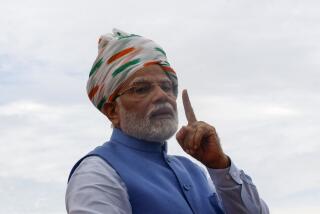S. Africa Intimidation Seen by ABC Head
- Share via
South African officials engaged in “a form of intimidation” by asking for the names and addresses of ABC newsmen in Johannesburg a day after Bishop Desmond Tutu was interviewed there for an ABC newscast, a network executive said Friday.
ABC provided the names of the employees involved in the interview--none are South African citizens--because they already were on file with the government, said ABC News president Roone Arledge. The government has taken no action against them so far, he added.
He also said that ABC will continue to contest South Africa’s harsh press restrictions, imposed as part of a state of emergency the government declared last week.
The restrictions, protested by both the South African and foreign media, were tightened Tuesday when officials barred foreign TV reporters from broadcasting live reports from Johannesburg. The government said its intent was to prevent the airing of what it called “subversive statements.”
The interview with Tutu, a Nobel Prize winner and a leading foe of South Africa’s apartheid policies, was sent live by satellite to the United States and taped for same-day broadcast Wednesday on ABC’s “World News Tonight.” One of the rare transmissions from South Africa this week, it was “in clear violation of the regulations set down by the government,” Arledge said.
Tutu appeared to deliberately flout the emergency regulations and invite arrest when he called for Western nations to support stepped-up economic sanctions against the Pretoria government. The regulations explicitly forbid statements endorsing sanctions.
Although nothing more than name-taking occurred in Johannesburg after the broadcast, “we were prepared when we aired that interview to lose our Johannesburg (news) bureau, if necessary,” Arledge told a press conference held for visiting TV writers at the Century Plaza Hotel.
“That comes up certain times in dealing with certain governments. If you put something on that’s going to displease a government like that (South Africa), they might deport your people,” he added.
However, he said, “we were fairly confident that there wouldn’t be anything serious that would befall our people there or we might have evacuated them before we aired it (the Tutu interview).”
When the black prelate was interviewed via satellite by ABC anchorman Peter Jennings, Arledge said, “We asked Tutu on the air, ‘Was this a violation (of government press restrictions),’ and he said, ‘Yes.’
“We also asked him on the air (whether there) was . . . anything that he wished we would take out to protect him, and he said ‘No.’ And so we aired it. We will continue to do that.”
What the South African government is doing, Arledge said, is trying to show “that a government can pass rules that can muzzle the press and can in fact keep us from reporting, can drive off the front pages of this nation and the television screens information that they don’t want reported.”
But American broadcast and print organizations “feel a responsibility . . . to fight that with whatever weapons we have,” Arledge said, “and the best weapon we have is to contest it and find people who will come on and say things that just fight the ban that has been imposed by the government. And that entails some risk.”
More to Read
Sign up for Essential California
The most important California stories and recommendations in your inbox every morning.
You may occasionally receive promotional content from the Los Angeles Times.












